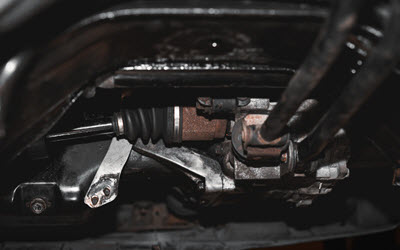
Your VW has earned a remarkable reputation for being a reliable, robust, and stylish car. Additionally, it provides an enjoyable driving experience every time you hit the road. But you know no vehicle components last forever, and its Half-Shaft Boot is no exception.
This part covers and protects the CV joints (they connect the wheels to the axle) by sealing them against dirt, debris, and moisture. If the boot remains intact, the joints also stay lubricated and work efficiently. However, when the boot cracks or wears out, it can affect the way your car handles, causing unusual vibrations, clicking noises, or even loss of control in severe cases. So, let’s keep that from happening. Stick to the end of this blog post to know the common causes that harm the Half-Shaft Boot and how a faulty one impacts your VW performance.
Causes Behind Your VW’s Half-Shaft Boot Damage and Their Symptoms
- Aging and Frequent Usage: Like any rubber component, the half-shaft boot can wear out over time or after prolonged Because in your car, it regularly comes across excessive engine heat, road friction, and flying debris, which dries out the rubber and makes it brittle. Eventually, you can see small cracks or splits on its body. Another warning sign can be messed-up grease on the inner side of the wheels or around the axle area. This usually occurs in the worst-case scenario when the boot has already started to fail and can no longer keep the lubricant sealed in.
- Rough Roads and Debris: When you drive your vehicle over potholes, gravel, or dusty roads, it ultimately puts the half-shaft boot at risk. Sharp rocks, broken pavement, or stray metal can easily scratch or tear the rubber, which may not be visible at first glance. However, later, you may notice subtle symptoms, such as a clicking sound when making a sharp turn in a corner area or an abnormal shuddering in the steering wheel.
- Exposure to Excessive Heat or Chemicals: Las Vegas summers not only affect you but also your car, to a great extent. That kind of extreme heat harms the half-shaft boot by drying out, weakening, and cracking the rubber much faster than usual. And most significantly, coming into contact with leaking engine oil, exposure to road salt, or even some strong cleaning chemicals can erode the rubber and make it comparatively less durable. So, mark these early indicators, such as visible cracks or chalky white-gray streaks, which prove the rubber is on its last leg.
Dangers of Your VW’s Malfunctioning Half-Shaft Boot
- Severe Drivetrain Damage: If a half-shaft boot fails, the grease starts leaking out, while dirt, moisture, and road debris enter the area where they should not. This contamination harms the CV joint and wears it out much faster than anyone would ever expect. And once the CV joint fails, your VW could suddenly lose power to the wheels, which can be a serious issue, compromising overall safety and drivability. Moreover, replacing a worn CV joint costs far more than simply swapping out a damaged boot, so if you want to keep the entire drivetrain in top shape and don’t neglect an acting-up boot.
- Risk to Your Overall Vehicle Safety: When a CV joint gets damaged due to a failed boot, it’s not something to take lightly. Because with a faulty joint, your VW can suddenly lose power while you are driving. So, before it reaches that point, you may notice alerts like the car pulling to one side, hear an odd clicking noise when turning, or even feel strange vibrations. Ignoring these symptoms could leave you stranded on the side of the road or cause more severe That’s why keeping an eye on your half-shaft boots is such a small but critical step for you and your car’s well-being.
- Oil Stains on Brakes or Garage Floor: A torn half-shaft boot that seeps out grease is not something that fixes itself; it only worsens over time. Once the grease starts escaping, it fails to stay securely on the axle. As a result, it can splatter onto nearby components, including the brake system, which may reduce its stopping power or cause loud and unusual noises when the brake pedal is pressed. Additionally, you may also notice dark, sticky stains appearing on the driveway or garage floor. These are the earliest signs that indicate a faulty or leaky boot. And if you ignore these issues, they can quickly turn into a much bigger, more expensive repair later.
Top Reasons to Trust Our Specialists to Fix Your VW’s Half-Shaft Boot Issues
At our Paladin Automotive, located  in Las Vegas, NV, our dedicated team for VW cars has years of hands-on experience with every model, from vintage Beetles to the latest SUVs. The best part is that we know exactly what your vehicle needs to perform at its peak. When it comes to half-shaft boot problems, we can diagnose the issue as soon as you reach out to us and identify the exact cause, followed by repairing or replacing the faulty or leaky boot with a new one. Don’t worry! We use only quality parts, double-check our work, and take the time to explain every step so you feel confident about the repair. Thus, if you want your VW to stay safe, smooth, and reliable mile after mile, visit our garage today to get everything back on track.
in Las Vegas, NV, our dedicated team for VW cars has years of hands-on experience with every model, from vintage Beetles to the latest SUVs. The best part is that we know exactly what your vehicle needs to perform at its peak. When it comes to half-shaft boot problems, we can diagnose the issue as soon as you reach out to us and identify the exact cause, followed by repairing or replacing the faulty or leaky boot with a new one. Don’t worry! We use only quality parts, double-check our work, and take the time to explain every step so you feel confident about the repair. Thus, if you want your VW to stay safe, smooth, and reliable mile after mile, visit our garage today to get everything back on track.


 5240 Spring Mountain Road B
5240 Spring Mountain Road B (702) 368-2886
(702) 368-2886
 in Las Vegas, NV, our dedicated team for VW cars has years of hands-on experience with every model, from vintage Beetles to the latest SUVs. The best part is that we know exactly what your vehicle needs to perform at its peak. When it comes to half-shaft boot problems, we can diagnose the issue as soon as you reach out to us and identify the exact cause, followed by repairing or replacing the faulty or leaky boot with a new one. Don’t worry! We use only quality parts, double-check our work, and take the time to explain every step so you feel confident about the repair. Thus, if you want your VW to stay safe, smooth, and reliable mile after mile,
in Las Vegas, NV, our dedicated team for VW cars has years of hands-on experience with every model, from vintage Beetles to the latest SUVs. The best part is that we know exactly what your vehicle needs to perform at its peak. When it comes to half-shaft boot problems, we can diagnose the issue as soon as you reach out to us and identify the exact cause, followed by repairing or replacing the faulty or leaky boot with a new one. Don’t worry! We use only quality parts, double-check our work, and take the time to explain every step so you feel confident about the repair. Thus, if you want your VW to stay safe, smooth, and reliable mile after mile, 

